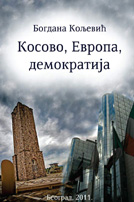| NSPM in English | |||
Nationhood beckons |
 |
 |
 |
| subota, 31. maj 2008. | |
|
With a compromise over police reform paving the way for the eventual signing of a stabilisation and association agreement (SAA) on June 16, Bosnia and Herzegovina has finally taken its first step towards future membership of the EU. This important juncture provides an opportune moment at which to reconsider and reconfigure international involvement in this still fragile country. Whilst intensive engagement remains essential for further reforms, Bosnia and Herzegovina is ready to make the transition from being an international protectorate to a prospective EU member state. Steps should therefore be taken to close the much derided Office of the High Representative (OHR), terminate the Bonn powers and transfer all responsibilities for implementation of the Dayton peace agreement (DPA) and Euro-Atlantic integration to an expanded and strengthened EU Special Representative (EUSR). In late February, the peace implementation council (PIC), which oversees implementation of the DPA, indefinitely extended the OHR's mandate beyond June 2008, the previously planned closure date. In refusing to set a new deadline, the council hoped to avoid further undermining the OHR's standing by instead outlining a series of technical and political objectives that are first to be achieved. The continued erosion of the OHR's credibility and influence, however, combined with the dilution of its enforcement capacity, has contributed to the growing impotence of the Bonn powers. No longer capable of being exercised effectively, particularly for removing elected officials or for imposing legislation, the Bonn powers - the prime justification for retaining the OHR - have been rendered superfluous and should therefore be terminated. Nevertheless, Bosnia and Herzegovina remains unprepared for full-scale international disengagement. Necessary and important reforms - educational, judicial, public broadcasting, military and economic - will continue to require international facilitation, coordination and oversight. Though the lure of EU membership has often proved insufficient to induce difficult and contentious policies, in part because potential gains from membership don't benefit politicians in the short term, it still constitutes the most effective framework for catalysing reform. As such, the OHR's responsibilities should be transferred to the EUSR, thereby making the EU the key international player in Bosnia and Herzegovina. The basis for this is already in place - the high representative has, since Lord Ashdown's tenure, simultaneously functioned as the EUSR, co-operating closely with EUFOR and the EU police mission; whilst the signing of an SAA allows for increased financial and technical assistance to Bosnia and Herzegovina. Accordingly, planning for a reinforced and more decisive EUSR must intensify before the PIC steering board meets again in June. In order to contend with the plethora of challenges that remain, the EUSR requires a new mandate and greater capacity, including an expanded office and budget. Without the Bonn powers, the EUSR must more assertively deploy its soft powers, withholding assistance where and when such inducements fail to encourage compromise and progress, as was practiced in Croatia earlier this year. The EU should also exploit a broader range of policy tools and instruments, based upon the rigorous methodologies successfully employed in Romania and Bulgaria, adapted to the particularities of Bosnia and Herzegovina. By doing so, the capacity of domestic institutions will benefit from assuming intensified ownership of the reform agenda. Strengthening the EUSR will also contribute to the development of a more effective common foreign and security policy and will serve to reinforce the European perspective in the western Balkans, at a time when events in Kosovo pose significant challenges. To complement this development, the EU should immediately consider candidate status for Bosnia and Herzegovina and ensure greater financial resources, both through the instrument for pre-accession assistance and through bi- and multilateral donor support, particularly for infrastructure projects and economic development. If transition and local ownership remain the overriding goals, as PIC recently reiterated, then the time has come to transfer the OHR's responsibilities to the EUSR, dispensing with the Bonn powers in the process. Continuing to treat Bosnia and Herzegovina as an international protectorate as opposed to a future EU member state will only continue to stifle domestic capacity building - "capacity sucking-out" in the words of Francis Fukuyama - and inhibit the development and consolidation of a functional democracy. It is clear that the Bonn powers are a now an untenable and obsolete way of reforming Bosnia and Herzegovina' s political dynamics. With the expected signing of an SAA on June 16 providing the platform for more extensive European engagement in Bosnia and Herzegovina, the PIC should now move to close the OHR "in the shortest possible time".
GUARDIAN (UK) |
Ostali članci u rubrici
- Playing With Fire in Ukraine
- Kosovo as a res extra commercium and the alchemy of colonization
- The Balkans XX years after NATO aggression: the case of the Republic of Srpska – past, present and future
- Iz arhive - Remarks Before the Foreign Affairs Committee of the European Parliament
- Dysfunction in the Balkans - Can the Post-Yugoslav Settlement Survive?
- Serbia’s latest would-be savior is a modernizer, a strongman - or both
- Why the Ukraine Crisis Is the West’s Fault
- The Ghosts of World War I Circle over Ukraine
- Nato's action plan in Ukraine is right out of Dr Strangelove
- Why Yanukovych Said No to Europe

.jpg)




















